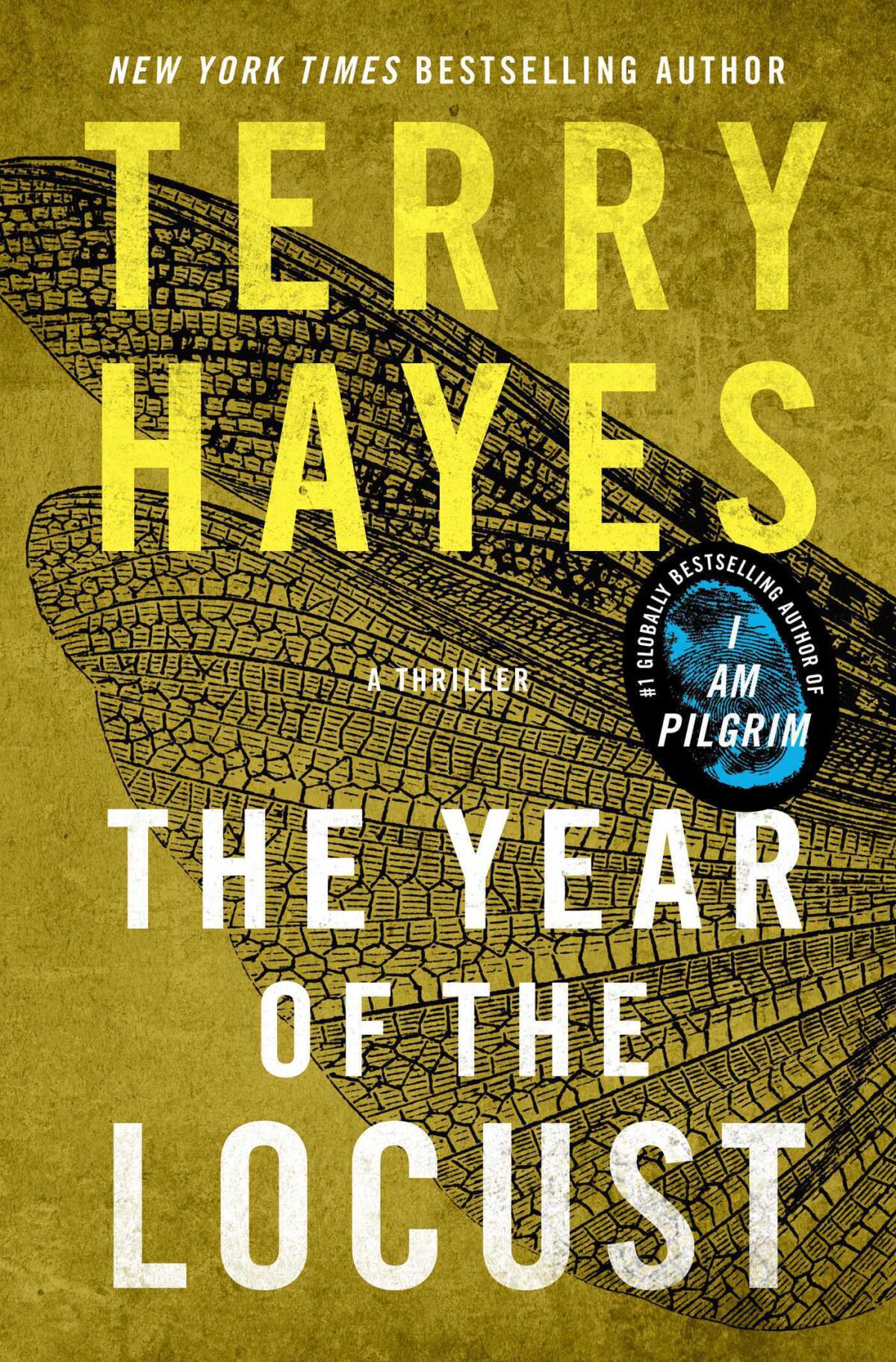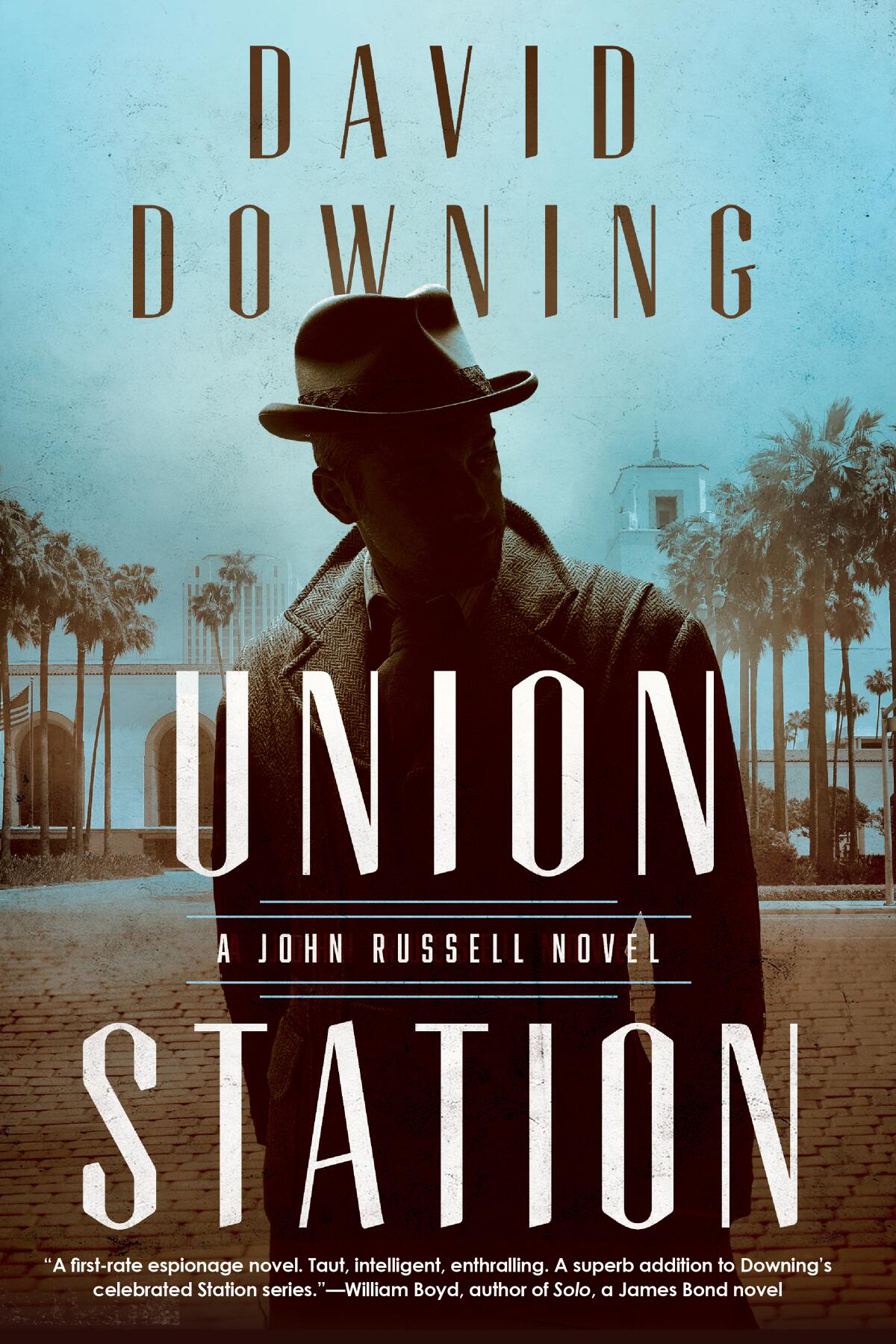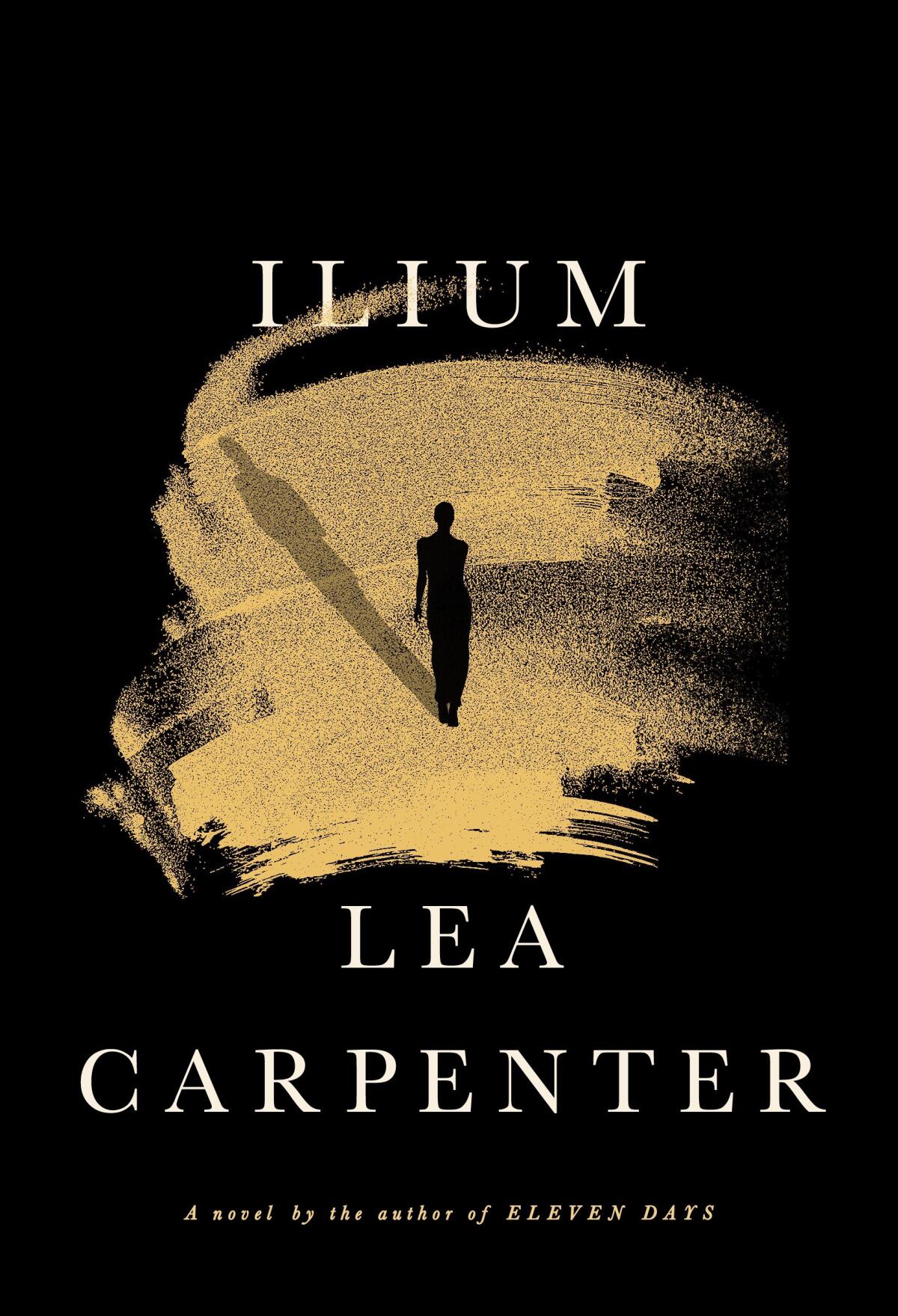Espionage fiction writers pick their favorite fictional spies

- Share via
Dying to Know
3 Spy Fiction Writers Answer Burning Questions
If you buy books linked on our site, The Times may earn a commission from Bookshop.org, whose fees support independent bookstores.
When asked about the connection between writers and spies, John le Carré (“Tinker Tailor Soldier Spy”) said: “It’s part of a writer’s profession, as it’s part of a spy’s profession, to prey on the community to which he’s attached, to take away information — often in secret — and to translate that into intelligence for his masters, whether it’s his readership or his spy masters.” Three writers of recent espionage fiction turn their keen powers of observation on 1950s Los Angeles, current-day Europe and beyond to shed light on their times — and, chillingly, ours.

The Year of the Locust
By Terry Hayes
Atria Books: 800 pages, $32
Ten years after he penned “I Am Pilgrim,” a blockbuster tale of espionage that presaged a virus similar to the coronavirus, Terry Hayes is back with another mind-bending epic that hops the globe and several genres to tell the story of Kane, a CIA operative on the trail of Roman Kazinsky — aka Abu Muslim al-Tundra. Presumed dead at the hands of the U.S., al-Tundra had earned “an exalted place in the dark pantheon of terrorism” and the nickname the Locust because of an elaborate tattoo that adorns his back. Like the dormant insect, the Locust has reemerged, intent on destroying the world. But unlike many thrillers where the ubiquitous madman is thwarted with just seconds to spare, Hayes shows us the other side of midnight in a way that throws the novel into another dimension and genre, or two. Sure, “The Year of the Locust” could have used a bit more of a trim without destroying its impact, but Hayes also brings to this thriller experience as a screenwriter of some of the last century’s most kinetically violent action films (“Mad Max 2: The Road Warrior,” “Mad Max Beyond Thunderdome”). So don’t look too critically at the man behind the curtain and hang on for the ride.
What makes your protagonist such an interesting character to write?
In the 10 years since I wrote “I Am Pilgrim,” the biggest change in espionage fiction is that the good examples are using much more complicated and inventive situations in their plots. In the last 10 years we have all learned that the issues in the Middle East, Afghanistan, the Red Sea and Gaza — just as examples — are extremely complex and do not offer any easy solutions. Geopolitically, things seem to have deteriorated, which created an interesting milieu for my spy — code name Kane — to inhabit. As a Denied Access Area spy, he’s right at the spear-point of the intelligence business. The novel also deals with leading edge military technology and off-Earth mining. I have always had an interest in just-over-the-horizon science. The hottest thing in military science at the moment is cloaking technology — super-stealth, or Harry Potter’s cloak of invisibility for those at the back of the class. How do you completely hide an asset — a tank or a submarine — from the enemy? Whoever can turn it invisible by bending light around it will change warfare just as dramatically as the Chinese alchemist 900 years ago who was looking for the elixir of life and discovered gunpowder. So, my own interests, and their narrative possibilities, combined with the febrile situation on so many theatres of conflict, made it an interesting and propulsive story to tell.
You’re on a dangerous mission in a hostile nation. You will have support from three agents in the field. Which espionage writers or fictional spies do you choose, and why?
The first piece of advice, is: don’t go. But if they put a gun to your head or take your family hostage, then rely on John le Carré first. There are few better spy novels than “Tinker Tailor Soldier Spy.” A former intelligence officer himself, le Carré was a towering intellect and a great storyteller. So if you get captured, at least he will be able to entertain you before the torture starts. Then make sure Frederick Forsyth is with you. By bringing a feeling of documentary realism to “Day of the Jackal,” he changed the genre forever. Lastly, sign up Robert Ludlum. Has there ever been a better set-up than the opening sequence of the first “Bourne” novel? A guy gets fished out of the Mediterranean, left for dead. He has amnesia and the only clue to who he is, what he does and who tried to kill him, is a microchip embedded on his thigh. If you don’t want to read the next page, I think we should check for a pulse.

Union Station
By David Downing
Soho Crime: 408 pages, $28
Over the course of seven novels and a prequel, John Russell has played the Nazis, Russians and Americans while trying to hold his family together. All that’s past by 1953, as Russell and family find themselves in Los Angeles in “Union Station.” Or is it? William Faulkner’s famous line “The past is never dead. It’s not even past,” comes to mind as the British journalist settles in to write puff pieces for German and English newspapers and a nonfiction book about American corporations’ involvement with Nazi Germany. But his German actress wife and left-of-center politics are put on the radar of U.S. immigration authorities and Senator McCarthy’s House Un-American Activities Committee. Are their minions following him around town? Or is it one of his enemies from his double-agent days? A free trip to the inaugural Berlin Film Festival, honoring his wife’s contributions to cinema, provides a hoped-for respite and chance to see family and friends, but that’s when the espionage plot really kicks in. While “Union Station” is more textured and reflective in its earlier pages than other entries in the “Station” series, it brims with Russell’s complicated history and David Downing’s meticulous research, including trips down memory lane to South L.A. record store Dolphin’s of Hollywood, Venice Beach’s original amusement park and, more somberly, the displacement of Mexican families from Chavez Ravine and McCarthyism’s impact on Hollywood. Read “Union Station” for the local spin but explore this impressive series for a full picture of an era with eerie similarities to our own.
What makes your protagonist such an interesting character to write?
As a lapsed communist who still hates capitalism, in the early books Russell had to deal with something that seems worse than either — Hitler and his Nazis. His still-functioning moral compass doesn’t point him in any particular political direction, but does allow him to play the Nazis’ enemies off against each other. By bringing him, his actress wife Effi and adopted daughter Rosa to Los Angeles in “Union Station,” I got to research the early years of TV sitcoms and the McCarthyite witch hunts which accompanied them. What I — and Russell — found most worrying were the things that Nazi Germany and 1950s L.A. had in common — the rampant racism and savage law enforcement and politicians bought and paid for by big business. I felt this was worth pointing out, particularly in today’s U.S. political climate.
What gave you the most joy in writing this novel?
Apart from getting it finished, the same as always — learning new stuff and, occasionally, thinking I’d got a scene or a piece of dialogue just right. If your own writing doesn’t make you laugh or cry once in a while, you should probably be doing something else.
You’re on a dangerous mission in a hostile nation. You will have support from three agents in the field. Which espionage writers or fictional spies do you choose, and why?
I know Sherlock Holmes got involved in a couple of espionage cases, and he’d be a useful guy when it came to working out what was happening and what needed doing. He could pass his intel on to Jason Bourne, who would do the necessary angsting and ass-kicking. As insurance, someone from Mick Herron’s “Slow Horses” team could be brought in to give the enemy a false sense of security.

Ilium
By Lea Carpenter
Knopf: 240 pages, $27
Lea Carpenter’s fiction often uses classic literature and genre tropes — of the war novel and spy fiction, especially — to explore deeper human emotions. In “Ilium,” Carpenter’s third novel, she uses those tools to tell the story of an unnamed narrator who chronicles her initiation into the world of espionage 20 years ago. It begins with meeting and marrying Marcus, an impulsive, wealthy older American. By contrast, the woman’s early childhood years are dismal shades of gray — near-poverty, arguments between her parents, exotic locales only pins in maps. The couple’s whirlwind courtship and subsequent wedding among a hastily assembled international group of Marcus’ friends is prelude to the bridegroom’s announcement that he’s dying and needs her help with a “new project.” That project involves the young woman’s infiltration of the Cap Ferret compound of Edouard, a duplicitous former Russian general and doting family man. The young woman — barely 21 at the time and with characteristics that make her perfect for the job — is the Trojan horse deposited by helicopter at the heavily secured estate and tasked with providing a layout of the property to the team — er, the wedding guests — charged with his exfiltration. More a character study about a woman who learns her fantasies come at a price than an action-packed spy tale, “Ilium” still packs in enough twists to make it the most affecting, emotionally resonant story among the current crop of espionage novels.
What makes your protagonist such an interesting character to write?
It’s really about her journey, which involves risk, loss, travel to exotic locales and, ultimately, developing a new identity. She endures devastating revelations and comes to see the consequences of her actions. This sounds simple but, for her, it was not. Most of the characters I have written journey internally; they think and feel. With this character, the journey is both internal and external. She goes to a foreign place and is literally transformed by it. This is intriguing, the adoption of a new persona, and very much at the heart of spywork. Character is action; every assassin knows this.
What gave you the most joy in writing this novel?
I wanted to write characters who were loving, charismatic and yet capable of killing. They are fathers and mothers. They have dreams. They fall in love. Yet their profession is killing. I remember studying “Paradise Lost” in school and how the professor explained that the devil was Milton’s coolest character, by design. In “Ilium,” I finally got to write my devils. There was joy in that. There was also joy in finding the character of Felix, Edouard’s young son. I have young boys and know the unique love one can have with, and for, a child.
You’re on a dangerous mission in a hostile nation. You will have support from three agents in the field. Which espionage writers or fictional spies do you choose, and why?
Bill Donovan, one of the founders of the OSS, is quoted as saying he wanted men “with a PhD who can handle themselves in a bar fight,” and that seemed to work. And so, one: Jason Bourne, for his competence, coupled with vulnerability and a sense of humor. Two: Mick Herron’s Diana Taverner, the Lady Macbeth of espionage. Taverner probably has three PhDs and could bring Jackson Lamb along gratis, with his networks and cigarettes. And three: Doron Kavillio, the ultimate warrior poet in the Netflix series “Fauda.” Doron always finds a way to come to the rescue.
A member of the National Book Critics Circle, Woods is the editor of several anthologies and four novels in the “Charlotte Justice” mystery series.
More to Read
Sign up for our Book Club newsletter
Get the latest news, events and more from the Los Angeles Times Book Club, and help us get L.A. reading and talking.
You may occasionally receive promotional content from the Los Angeles Times.










